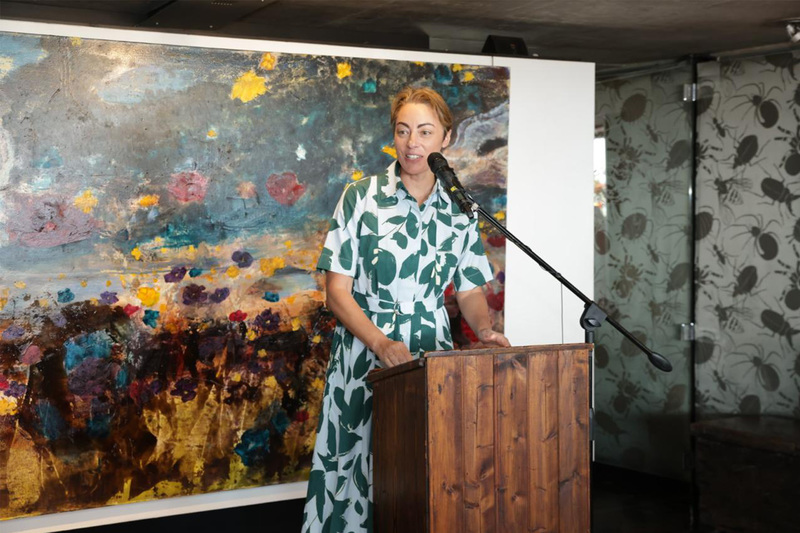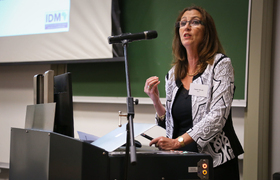Katye Altieri scoops Oppenheimer Memorial Trust’s New Frontiers Research Award
15 May 2025 | Story Staff writer. Read time 5 min.
The University of Cape Town’s (UCT) Associate Professor Katye Altieri has received the Oppenheimer Memorial Trust’s New Frontiers Research Award for 2025 – making her the second ever winner of the five-year R7.5 million prize.
The Oppenheimer Memorial Trust introduced this award to bolster South Africa’s global reputation for research excellence and to attract and retain early- to mid-career researchers who will build diverse, high-performance research teams, foster collaboration and strengthen the country’s academy. The award gives exponentially talented researchers the freedom and flexibility to pursue bold ideas and push the boundaries of knowledge. In 2024, senior lecturer in UCT’s Department of Physics Dr James Keaveney received the inaugural award.
Ground-breaking research
This year’s winner, Associate Professor Altieri, is a scholar in oceanography in UCT’s Faculty of Science. Thanks to the award, her research over the next few years seeks to establish whether air pollution-derived nitrogen improves the ocean’s ability to remove greenhouse gasses from the atmosphere or whether it creates an even bigger problem.
Altieri’s proposal to secure her entry topped 175 entries across various disciplines, including astrophysics, visual arts, food security, ecology, paediatric immune disease, as well as neuroscience. The announcement was made during a special event held in Johannesburg on Monday, 12 May.
“We must support South African academia with the resources they need to compete globally and contribute knowledge that changes our world for the better.”
“We must support South African academia with the resources they need to compete globally and contribute knowledge that changes our world for the better,” said Rebecca Oppenheimer, the chairperson of the Oppenheimer Memorial Trust.
“Altieri is precisely the kind of researcher we envisage for the award. Her [research] idea… is certainly bold and it addresses a significant gap in our knowledge of how the air pollution we create impacts climate change.”
Forging new ways of scientific thinking
As an atmospheric chemist and oceanographer, Altieri said it is widely known that oceans help to remove the greenhouse gas carbon dioxide (CO2) from the atmosphere, and nitrogen helps the oceans do that. However, she added, nitrogen can also spur the production and release of nitrous oxide (N2O), another greenhouse gas 300 times more potent than carbon dioxide.
“We have doubled the amount of nitrogen in the atmosphere through activities such as fossil fuel combustion and agriculture. That nitrogen, even from far inland, is swept out to sea and settles in the ocean,” she said.

“But we don’t know exactly how much pollution-derived nitrogen reaches the open ocean, and we don’t know exactly what happens when it ends up in the ocean: does it increase the ocean’s ability to remove greenhouse gases from the atmosphere, or the emission of much more deleterious N2O into the atmosphere?”
The reason for this knowledge gap, Altieri explained, is because atmospheric chemists and oceanographers tend to work in silos and not together.
“I intend to help change that by forging new ways of scientific thinking about both our atmosphere and our oceans, helping us to build knowledge in ways we haven’t before. This multidisciplinary approach will inform governments’ climate change policy frameworks going forward,” she said.
Ideal location
Because the country is a leading emitter of air pollution and provides access to three diverse ocean systems: the nutrient-rich, cold Benguela current up the west coast of Africa; the ocean desert of the South Atlantic Ocean, which is comparatively nutrient-poor and has limited marine life; and the “time machine” Southern Ocean, which is closer to the pre-industrial atmosphere compared with anywhere on earth – it makes it the ideal location for this research.
“Being able to measure and compare these environments will be invaluable to our research. Added to this, we have access to the world-class polar research vessel, the R/V SA Agulhas II, which allows for research operations in these diverse ocean regions,” Altieri said.
“While South Africa is the springboard, the integration between the atmosphere and the ocean is, from a scientific perspective, inherently global. So, what we learn from the oceans around South Africa will have bearing on our entire planet.”
Proud moment
Professor Jeff Murugan, UCT’s acting Deputy Vice-Chancellor for Research and Internationalisation said Altieri’s award is a proud moment for the university. He thanked the Oppenheimer Memorial Trust for its visionary trust in early and mid-career researchers during a time when science, especially climate science faces challenges.
“We are immensely proud of our researchers at UCT, in particular [Associate Professor] Altieri.”
“We are immensely proud of our researchers at UCT, in particular [Associate Professor] Altieri. We’re dedicated to [producing] research that matters,” Professor Murugan said.
 This work is licensed under a Creative Commons Attribution-NoDerivatives 4.0 International License.
This work is licensed under a Creative Commons Attribution-NoDerivatives 4.0 International License.
Please view the republishing articles page for more information.










